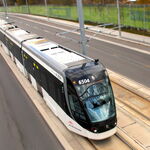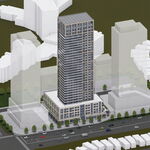That's kind of a sad point of view to be honest. Times Square is one tiny corner of New York. If you want the specific type of vibrancy that suites your taste, there are plenty of other neighbourhoods that you can visit. Those types of neighbourhoods are almost never in the hearts of major world cities. That's not a bad thing. By the way, Times Square is every bit as busy and much, much safer now than it was. It's a different kind of vibrant, but it's not less vibrant.
It's a different kind of vibrant, but it's not less vibrant.
Bingo! I've not been suggesting there is zero vibrancy, I've agreed several times that the city is bigger now, busier, has more stuff etc., and likewise with NYC. Even if I would 'concede' that the city is no less vibrant today - or even more vibrant today than in the past - I would still argue that the parameters are quite different, that the kind of vibrancy now is overwhelmingly consumerist, gentrified and within the interactively diminished context of the digital era, which ultimately creates a less vibrant vibrancy, relatively speaking... so if Times Square isn't an engaging example for you just pick one, it was fairly 'off the top of my head' anyway.
Consumerism doesn't define the urban experience any more now than in the 70s. Think about how many more people are in urban squares now. Art galleries, museums, free festivals, and performing arts spaces are all in greater number now. Are people socializing in coffee shops and tapas bars in 2014 being more consumerist than people browsing records in the 70s? I'm not buying your argument (pardon the pun).
Well yes, as I mentioned before: though
buying records was a consumer activity, the
shopping experience wasn't a consumerist one. Record shops were where people
went/gathered to discuss music, learn, discover new bands, meet people and interact. I'm not suggesting every trip to the store was this way, sometimes you just wanted to grab something, but that the larger urban stores or smaller niche stores were often destinations within their cities and for very non-consumer reasons... ditto with book shops.
I find it very difficult to accept that the urban experience is not more consumerist today than in the past, we live in a global consumerist world after all and so it follows. Also, i'm not convinced there are more performing arts spaces/public hang out spaces today than prior to the millennium, and in fact I can't help but feel there were more and that they were more vibrant (heck, if only for there being less entertainment options in the home)
I grant you that the city is growing in real terms so a bigger population today means bigger crowds today but if Toronto in the 70s or 80s had the population and density it has today it would be a very different place and have a different kind of vibrancy, which is very telling in and of itself.




